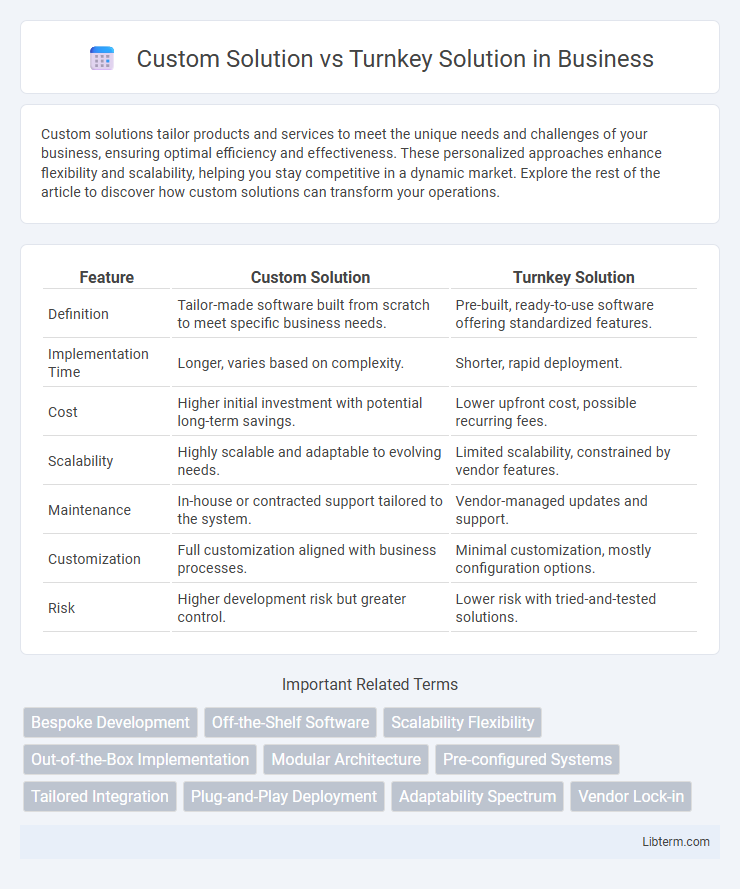Custom solutions tailor products and services to meet the unique needs and challenges of your business, ensuring optimal efficiency and effectiveness. These personalized approaches enhance flexibility and scalability, helping you stay competitive in a dynamic market. Explore the rest of the article to discover how custom solutions can transform your operations.
Table of Comparison
| Feature | Custom Solution | Turnkey Solution |
|---|---|---|
| Definition | Tailor-made software built from scratch to meet specific business needs. | Pre-built, ready-to-use software offering standardized features. |
| Implementation Time | Longer, varies based on complexity. | Shorter, rapid deployment. |
| Cost | Higher initial investment with potential long-term savings. | Lower upfront cost, possible recurring fees. |
| Scalability | Highly scalable and adaptable to evolving needs. | Limited scalability, constrained by vendor features. |
| Maintenance | In-house or contracted support tailored to the system. | Vendor-managed updates and support. |
| Customization | Full customization aligned with business processes. | Minimal customization, mostly configuration options. |
| Risk | Higher development risk but greater control. | Lower risk with tried-and-tested solutions. |
Understanding Custom Solutions
Custom solutions offer tailored software or services designed specifically to meet the unique requirements of a business, ensuring optimal alignment with internal processes and goals. They provide flexibility, scalability, and the ability to integrate seamlessly with existing systems, which can enhance operational efficiency and competitive advantage. Investing in a custom solution often involves higher initial costs and development time but results in a product that precisely fits the organization's needs.
Defining Turnkey Solutions
Turnkey solutions provide fully developed, ready-to-use systems designed to meet specific business needs with minimal client intervention. These solutions streamline implementation by delivering all necessary components, including hardware, software, and support, pre-integrated and tested for immediate deployment. By offering standardized functionality and quicker setup times, turnkey solutions reduce project complexity and accelerate time-to-value for organizations seeking efficient, out-of-the-box services.
Key Differences Between Custom and Turnkey Solutions
Custom solutions offer tailored software or products designed to meet specific business requirements, ensuring flexibility and scalability for unique operational needs. Turnkey solutions provide pre-built, ready-to-use systems that enable faster deployment and reduced implementation costs but often lack customization options. Key differences include the level of personalization, development time, cost structure, and adaptability to changing business demands.
Pros and Cons of Custom Solutions
Custom solutions offer tailored software designed specifically to meet unique business requirements, enhancing flexibility and scalability. They demand higher initial investment and longer development time compared to turnkey solutions, possibly increasing project complexity and resource allocation. However, custom solutions provide greater control over features, security, and integration capabilities, making them ideal for organizations with specialized workflows and long-term growth plans.
Advantages and Disadvantages of Turnkey Solutions
Turnkey solutions offer rapid deployment and reduced complexity by providing fully developed systems ready for immediate use, which minimizes the need for extensive customization or integration. Their main disadvantage lies in limited flexibility, as these solutions may not perfectly align with unique business requirements, potentially leading to inefficiencies or additional costs for modifications. Companies prioritizing speed and standardized processes benefit most from turnkey solutions, while those requiring tailored features might face challenges adapting them to specific operational needs.
Cost Analysis: Custom vs Turnkey Solutions
Custom solutions often require higher upfront investment due to tailored development, extensive customization, and longer implementation timelines, resulting in increased labor and project management costs. Turnkey solutions provide cost predictability with fixed pricing and faster deployment but may incur ongoing fees for licenses, maintenance, and limited flexibility, potentially leading to higher long-term expenses. Detailed cost analysis must include initial expenditures, scalability needs, total cost of ownership, and potential hidden costs to determine the optimal balance between customization benefits and budget constraints.
Scalability and Flexibility Considerations
Custom solutions provide higher scalability and flexibility by allowing tailored features and architecture that adapt to evolving business needs and increased workloads. Turnkey solutions offer quick deployment with predefined functionalities but may limit scalability and customization options, potentially requiring significant modifications to support growth or unique requirements. Evaluating scalability and flexibility demands ensures alignment with long-term business goals and technological advancements.
Industry Applications and Use Cases
Custom solutions provide tailored software or hardware configurations designed specifically for unique industry requirements, enabling precise workflow integration in sectors like healthcare, manufacturing, and finance. Turnkey solutions offer ready-to-deploy systems that streamline implementation and reduce time-to-market, commonly used in retail POS systems, standard CRM platforms, and common IoT deployments. Industry use cases favor custom solutions for complex environments requiring adaptability, while turnkey solutions suit businesses needing rapid, cost-effective deployment with standardized functionalities.
Decision Factors: Which Solution Fits Your Business?
Choosing between a custom solution and a turnkey solution depends on factors such as budget, timeline, and specific business requirements. Custom solutions offer flexibility and scalability tailored to unique processes but often require higher investment and longer development times. Turnkey solutions provide rapid deployment and lower upfront costs, ideal for standardized needs or smaller companies aiming for quick operational setup.
Future Trends in Custom and Turnkey Solutions
Future trends in custom and turnkey solutions emphasize increased integration of artificial intelligence and machine learning, enabling more adaptive and scalable systems tailored to specific business needs. The rise of modular architectures and cloud-based platforms enhances flexibility, allowing turnkey solutions to offer greater customization while maintaining rapid deployment. Growing demand for sustainability and enhanced cybersecurity is driving innovation across both approaches, pushing providers to balance bespoke features with standardized, secure, and eco-friendly technologies.
Custom Solution Infographic

 libterm.com
libterm.com